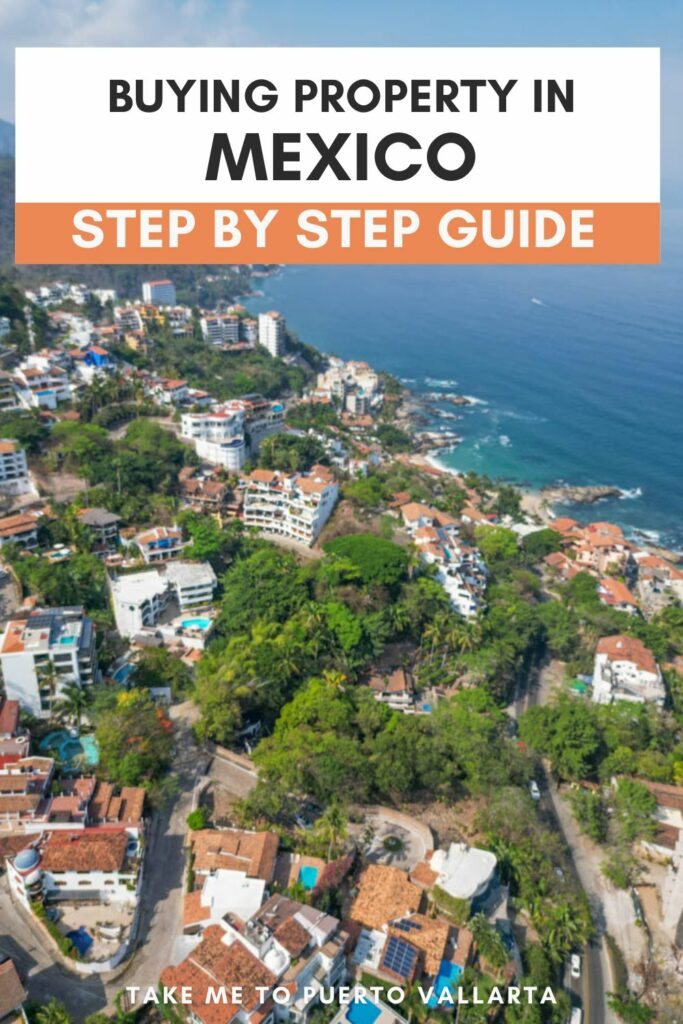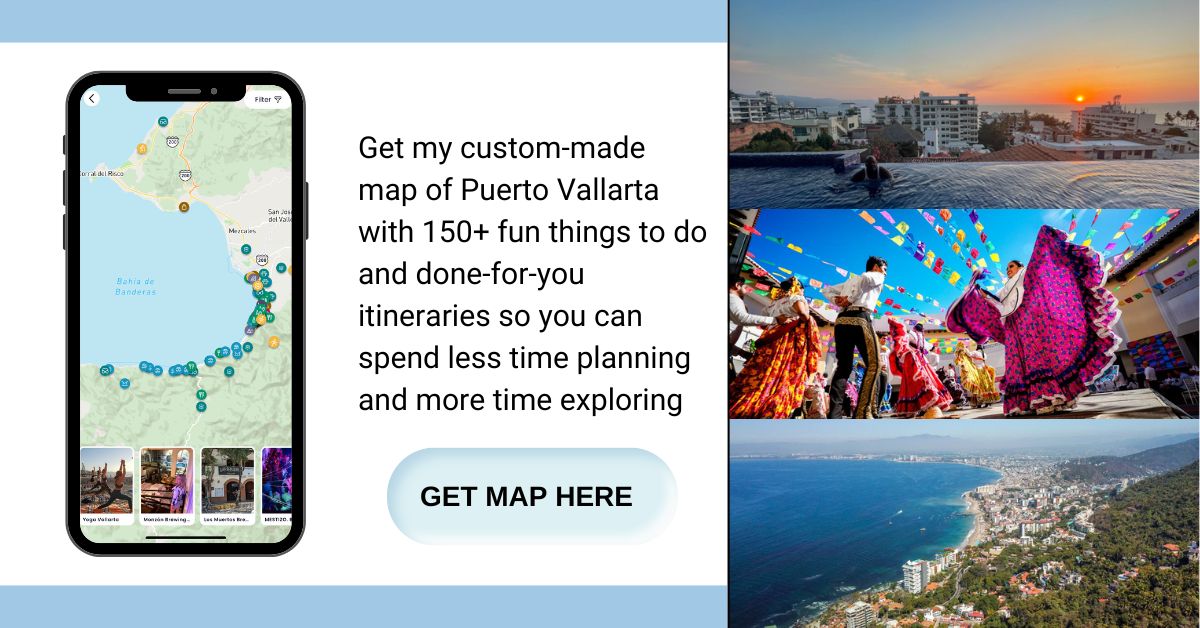This post may contain affiliate links. By clicking and making a purchase through the links, I earn a small commission at no extra cost to you. See my disclaimer for more information. This allows me to keep the site up to date and expand on resources.
“Can Americans buy property in Mexico?” If you’re asking, you’re probably like me a while back, curious and a bit unsure about the whole process.
My journey into buying a condo in Puerto Vallarta started with a mix of excitement and many questions. It’s one thing to vacation there, soaking up the sun, the sea, and the vibrant street life, and another to actually own a piece of this paradise.
This guide to buying a home in Mexico is straight from my own experience, with all those details you’re looking for: how the buying process works, what legal hoops you’ll need to jump through, and how to navigate the financial aspects without feeling like you’re in over your head.
Through this article, I’ll share my firsthand experiences alongside tips on everything from leveraging the fideicomiso system (that’s the trust you’ll likely need to buy that beachfront property) to understanding the role of a notario in Mexico, which is way different than what notaries do in the United States.
And because I’ve been through it, I’ll share those insider details on how to spot a good deal, what pitfalls to watch out for, and how to make sure you’re investing in a place that’s not just beautiful but also a smart investment.
From scanning listings to finally holding the keys to my own place in Puerto Vallarta, I’ve learned a lot, and I’m here to share it all with you.
Whether you’re eyeing a cozy condo, a beachfront villa, or a quaint house in a colonial city, getting there might be easier than you think.
Questions about Puerto Vallarta? Join my free PV Facebook group and connect with like-minded travellers!
Understanding the Mexico Real Estate Market
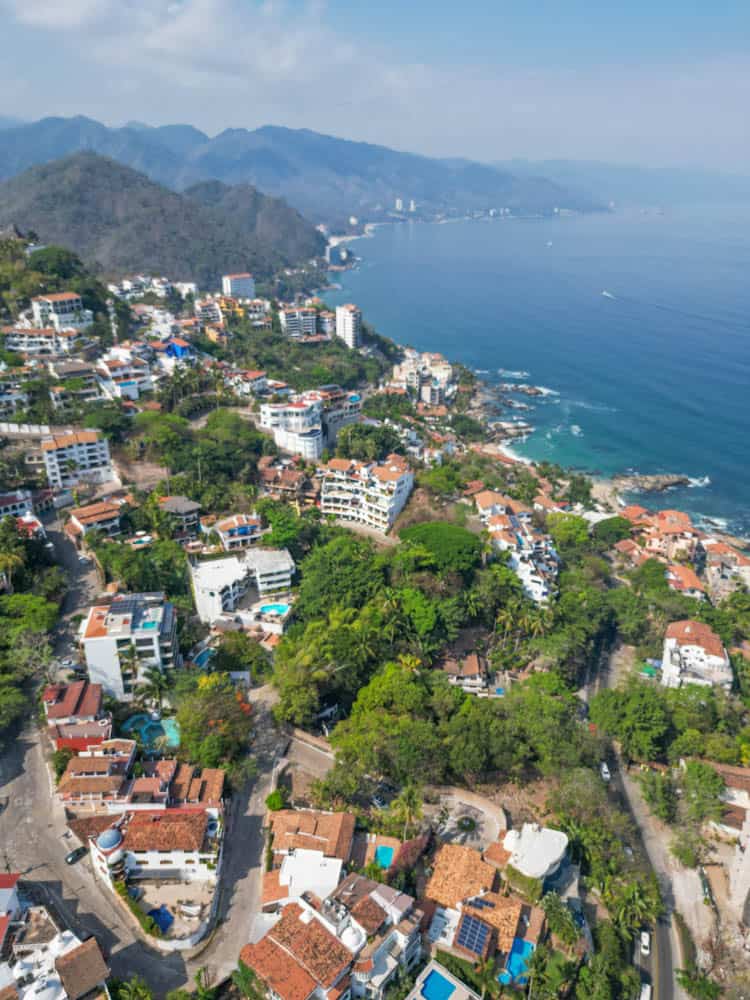
Diving into the Mexican real estate market is like stepping into a whole new world of opportunities and challenges. It’s diverse, with popular investment areas like the Riviera Maya attracting attention for its stunning beaches and robust tourism. Each region offers its unique allure and investment potential.
Puerto Vallarta, for me, wasn’t just a random choice. Beyond my love for its vibrant streets, friendly locals, and endless Pacific Ocean views, it’s a powerhouse for vacation rentals. The city’s popularity among tourists makes it an excellent spot for Airbnb investments.
I saw an opportunity to not only own a piece of this paradise but also earn a good return on investment when I’m not there, thanks to the thriving vacation rental market.
Understanding the market’s nuances was crucial. The Mexican real estate landscape varies significantly from region to region—what works in Puerto Vallarta might not in Tulum or Mexico City.
Each area has its property types, from beachfront villas to urban condos and traditional homes, catering to different lifestyles and budgets.
One key aspect of navigating this market successfully was working with a reputable real estate agent. My agent was more than just a guide; they were an essential partner in understanding local Mexican laws, finding the right property, and ensuring a smooth transaction process.
Their expertise was invaluable, especially when it came to understanding local peculiarities and ensuring my investment was sound.
If you’re eyeing Puerto Vallarta or its surrounding areas for your property investment, reach out to me at [email protected] and I’ll be happy to connect you with my agent.
Legal Requirements of Buying Property in Mexico as an American

Navigating the legal landscape for buying property in Mexico as a foreigner involves understanding a couple of key mechanisms put in place to facilitate such real estate transactions.
The primary legal framework that enables foreigners to own property in Mexico, especially in areas considered highly desirable, revolves around the concept of the “fideicomiso,” a type of real estate trust, and direct ownership with certain conditions.
The Fideicomiso System
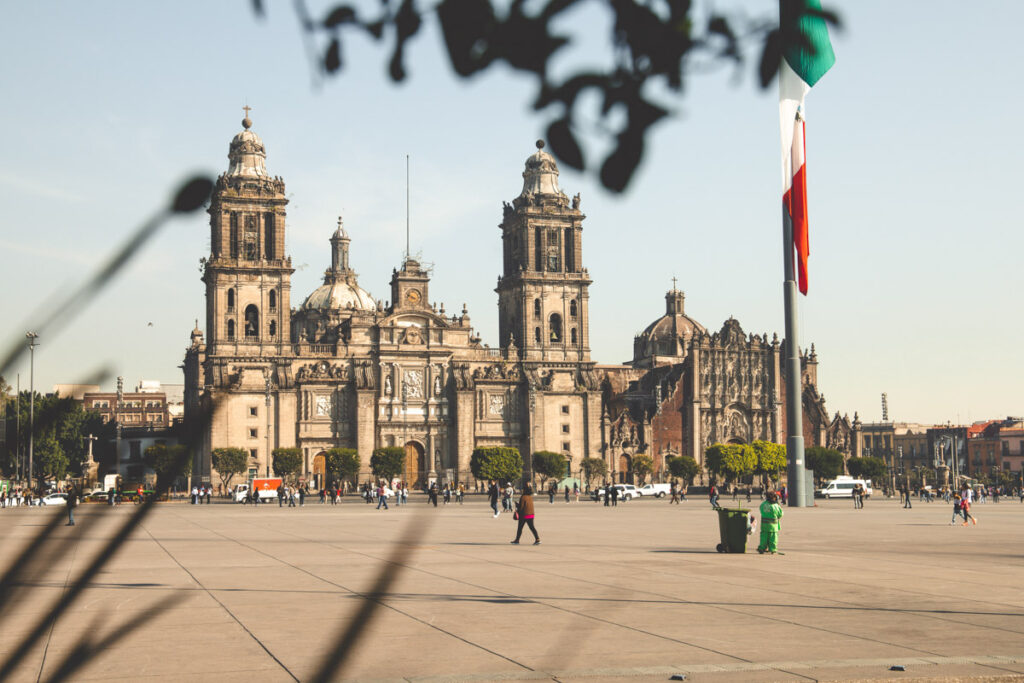
For properties located within the “restricted zones” — areas within 50 kilometers (about 31 miles) of the coast and 100 kilometers (about 62 miles) from international borders — foreign buyers cannot directly hold the title.
Instead, the Mexican government allows foreign ownership through a fideicomiso, essentially a trust agreement, for a renewable term of 50 years.
In this arrangement, a Mexican bank acts as the trustee by holding the title to the property, with the buyer (or the foreign beneficiary) having all the rights to use, rent, modify, or sell the property. This system is designed to encourage foreign investment in these prime locations while adhering to the Mexican Constitution.
Direct Ownership
Outside these restricted zones, foreigners have the opportunity to directly own property in Mexico, provided they notify the Mexican Foreign Affairs Ministry of their intention.
This path to ownership is more straightforward and offers more autonomy over the property, akin to property rights in other countries. It’s an appealing option for those looking to invest in urban or more centrally located areas away from the coastal and border regions.
Importance of Legal Representation
Regardless of the method of purchase, having a knowledgeable real estate attorney or a notario público (a licensed notary public in Mexico who has additional responsibilities, including legal representation in property transactions) is crucial.
They play a key role in ensuring that all legal requirements are met, including the necessary permits and the verification of the property’s legal status.
In my case, the developer assigned us a notario público for the closing.
An important insight for potential buyers eyeing new condos or pre-built properties, is the timing of moving in relative to receiving the deed
In Mexico, it’s quite normal to take possession of your property before the official paperwork is fully processed, a reflection of the bureaucratic pace rather than any oversight or mishap.
While this might cause some initial anxiety, understanding that this is a standard part of the buying process in Mexico can help ease concerns. The key is to remain patient and stay informed.
Choosing a reputable developer is crucial; they should not only deliver on the construction quality and timelines but also keep you updated on the notarial process.
A good developer will ensure transparency throughout the transaction, providing updates and guiding you through the final steps until the deed is officially in your hands.

Financial Considerations for Buying Property in Mexico as an American
When it comes to the financial aspects of buying property in Mexico, understanding the landscape of average house and land prices across various regions is crucial. Notably, the cost of living and property prices can vary dramatically from one part of Mexico to another.
For instance, Puerto Vallarta is one of the pricier real estate markets, trailing just behind Cabo.
However, it’s where I wanted to live and compensated with strong returns on investment, which swayed my decision to purchase here over more affordable options elsewhere. The choice ultimately hinges on whether the property is meant for personal use or purely as an investment.

Regarding the initial investment, buying property outright in cash is a common practice in Mexico. Yet, financing options are available, such as the Intercam dream loan, which caters to Canadians and Americans.
This option generally requires a larger down payment, about 35%, and necessitates proof of income akin to what one would expect in the U.S.
Additional costs also play a significant role in the financial planning of purchasing property in Mexico. The acquisition tax, for instance, is an upfront cost around 5-7% of the property’s value so you need to factor that into your budget.
Yearly property taxes are remarkably affordable, further lowering the barrier to long-term investment. For a two-bedroom condo in Puerto Vallarta, utilities remain quite reasonable—even with generous use of air conditioning during hotter months, my electricity bills never surpasses $100 monthly.
Water and gas fees add about $40 to the monthly expenses, underscoring the overall affordability of living in Mexico despite the initial purchase and setup costs.
Condo fees and other regular outgoings are also considerations. While these fees contribute to the total cost of ownership, the relatively low property taxes and utility costs in Mexico make real estate ownership here an attractive proposition.
It’s important for potential buyers to meticulously calculate these expenses to fully grasp what they can comfortably afford when investing in Mexican real estate.
How to Buy Property in Mexico as a U.S. Citizen: Step-by-Step Guide
Buying property in Mexico involves a sequence of steps that, while straightforward, require attention to detail and an understanding of local regulations.
Here’s a high-level overview of what you can expect during the process:
1. Research and Decide on the Location

Mexico is vast and diverse, with each region offering its unique benefits and challenges. Whether it’s the beachfront allure of the Riviera Maya or the historic charm of San Miguel de Allende, choose a location that fits your lifestyle or investment goals.
If you’re eyeing property in Mexico, whether for living or investment, the first step is truly getting to know the country.
On my initial visit to Mexico, I landed on the East Coast and prematurely thought it wasn’t for me. But then I explored more, especially the Pacific Coast, and it completely changed my perspective. Now, I call it home!
If you’re planning to live here, I highly recommend traveling around to find the area that resonates with you.
At this stage, you’ll also want to determine what kind of budget you have taking into account the financial considerations I’ve mentioned above.
3. Find a Reputable Real Estate Agent
Working with knowledgeable local real estate agents can streamline your search and negotiation process. They’ll provide invaluable insights into the market, help identify properties that meet your criteria, and guide you through the buying process.
My journey to finding the perfect property in Puerto Vallarta was significantly smoothed out by my real estate agent. I can’t imagine having done it without him!
If you’re looking for an agent in the Vallarta/Nayarit area, contact me at [email protected] and I’d be happy to connect you with mine.
3. Understand the Legal Framework for Foreign Buyers
Familiarize yourself with the “fideicomiso” system if you’re buying in the restricted zone or direct ownership options outside those areas. Knowing your rights and responsibilities is crucial.
4. Property Search and Visits
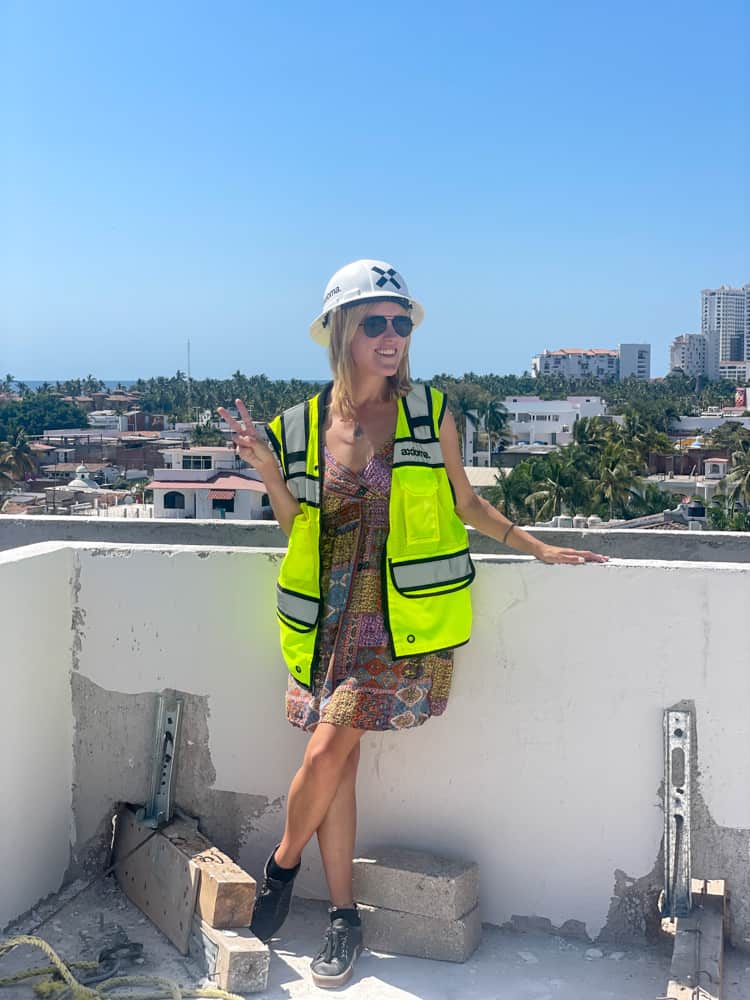
With the help of your agent, identify potential properties and schedule visits. Consider factors like location, amenities, potential for appreciation, and rental income if you’re looking at it as an investment.
I connected with my agent online before my visit, and once in PV, we hit the ground running. It took months of searching, looking at various properties, until I found the one that felt right.
If you’re considering a pre-built property, it’s crucial to research the developer thoroughly as you’re buying into something that isn’t built yet. Look into their previous projects to gauge their reliability; unfortunately, not all developers in Mexico maintain high standards.
5. Make an Offer and Negotiate
Once you’ve found a property that ticks all your boxes, your agent will help you make an offer. Be prepared for some back-and-forth negotiation until both parties reach an agreement.
When I finally settled on a property and made an offer, it was initially rejected by the developer, which was a bit of a blow after months of searching. But persistence paid off, and eventually, we reached an agreement that worked for both parties.
For those looking at pre-built properties, remember that you typically won’t pay the full amount upfront. While substantial discounts can be obtained for doing so, it also means taking on more risk.
6. Due Diligence
For existing properties, this involves verifying the property’s legal status, ensuring there are no liens or encumbrances, and confirming that all utilities and property taxes are up to date.
This step often involves a notary public (“notario público”) who plays a crucial role in the legal aspects of property transactions in Mexico.
7. Signing the Contract

After due diligence, you’ll sign a preliminary contract (“contrato de promesa de compraventa”) that outlines the terms of the sale, including payment schedules. This contract is binding and sets the stage for the final sale.
8. Final Payment and Closing

The closing process typically involves making the final payment, signing the deed (“escritura”), and registering the property in your name or under the fideicomiso. This step is also facilitated by the notary public, who ensures that all legal requirements are met.
For pre-built properties, the final payment and closing can indeed unfold differently than what you might expect with existing properties.
In my case, this final stage came months after I had already moved into my property, a timeline that might seem unusual but is actually quite common in Mexico, especially with new constructions. It’s crucial not to panic during this waiting period; remember, this delay is part of the normal process.
A competent and reliable developer plays a vital role in ensuring you’re kept in the loop about the notary process. Typically, for condominiums, developers will work with a notary to handle the closing process for the entire building in bulk.
This approach streamlines the process but also means that your individual closing might align with the developer’s broader timeline rather than your personal schedule.
9. Post-Purchase Considerations
After the purchase, there are several administrative tasks to handle, such as setting up utilities in your name, paying annual property taxes, and furnishing your property.
Buying Furniture in Mexico
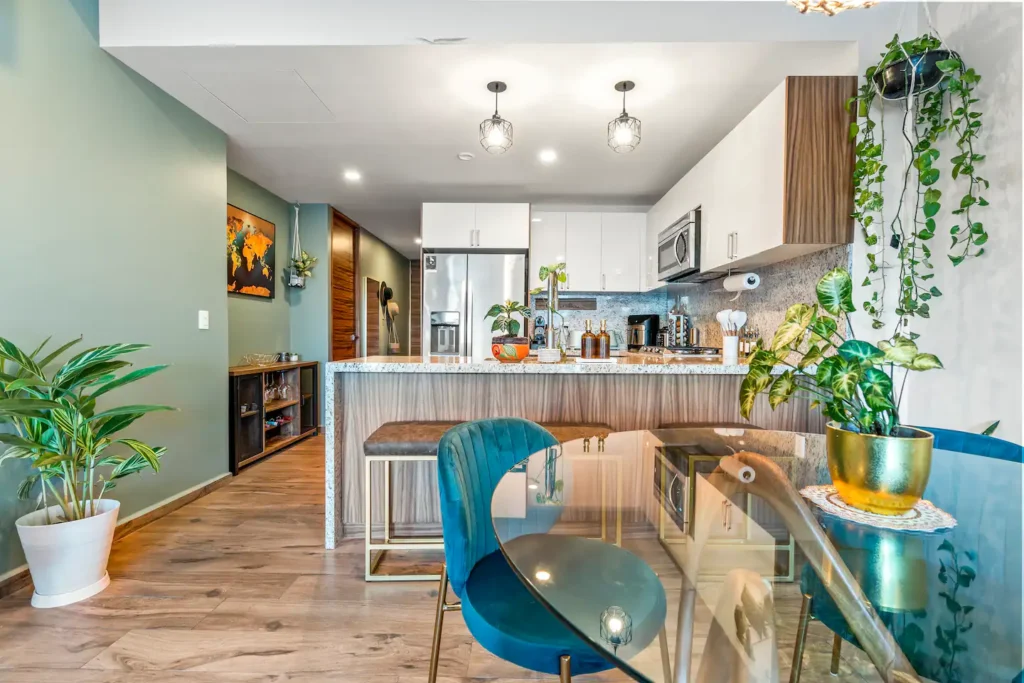
Unlike some existing properties that may come furnished, pre-built properties typically do not, unless specifically stated in the contract. Some developers might include appliances as part of the deal, but generally, expect the apartment to come bare-bones.
Initially, I considered using a turn-key service, which is a popular option in Puerto Vallarta for those looking to furnish their properties hassle-free. These services promise convenience by handling everything from furniture selection to interior design.
However, I quickly realized that while turn-key solutions offer simplicity, they come with a high price tag (and are not necessarily the quality you would expect).
I decided to design and furnish the apartment myself, which was no small feat. It involved a considerable amount of work, from selecting each piece of furniture to deciding on the décor.
Despite the challenges, this process was incredibly rewarding. It allowed me to inject my personal style into the space, making my apartment truly feel like a dream home.
Property management in Mexico
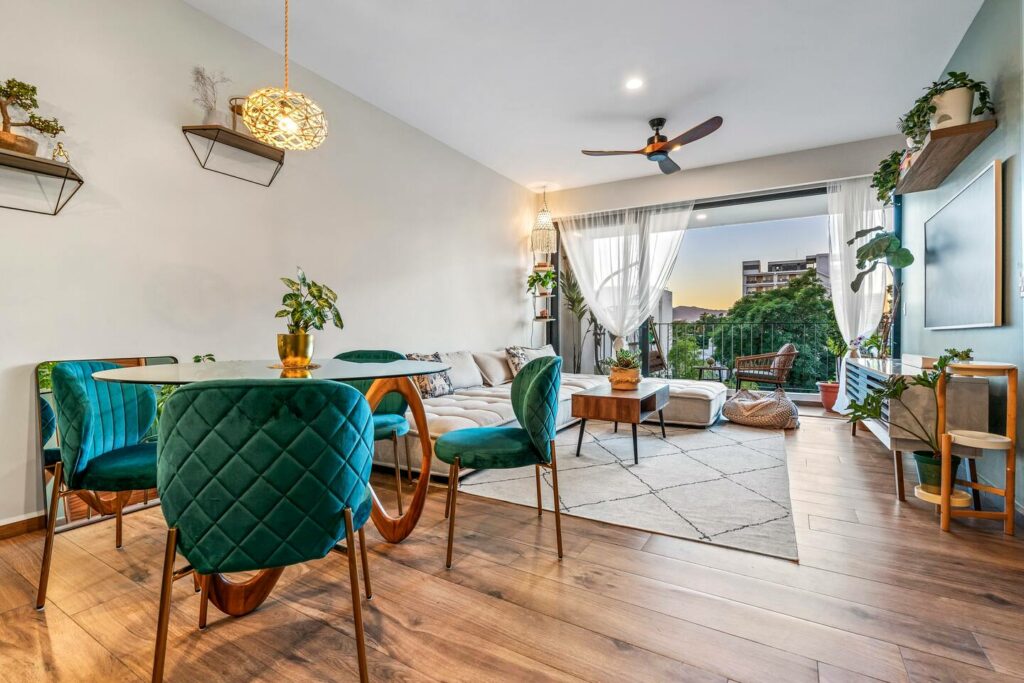
Choosing the right property management company, especially for vacation rentals, is crucial for maximizing your investment and ensuring your property is well-maintained.
Naya Homes offers boutique property management in Mexico, ensuring your home is well-maintained and generating income if you choose to rent it out. They manage a couple units in my building and all the owners are very happy with the service.
Their focus on home care is paramount, with a dedicated team treating each property as their own. This meticulous attention to detail means homeowners can rest easy knowing their investment is in good hands.
The comprehensive booking management service Naya Homes offers is another key benefit, handling reservations across over 15 online platforms to maximize visibility and occupancy rates without any hassle of managing it on your own.
Get a free revenue estimate for your property here
Need more help planning your trip to Puerto Vallarta? Get a custom-made itinerary or book a consultation call with me here.
Risks of Buying Real Estate in Mexico
Investing in property, anywhere in the world, comes with its set of risks. In Mexico, understanding these risks and how to mitigate them is crucial to protect your investment and ensure a smooth process.
Here are some common risks associated with buying property in Mexico and strategies to mitigate them:
- Legal Risks: The complexity of the legal system and the necessity of navigating through the “fideicomiso” (trust) for foreigners buying near the coast or border can be daunting. Mitigation involves hiring a knowledgeable real estate attorney or a reputable “notario público” who can guide you through the legalities, ensuring all documents are in order and your rights are protected.
- Developer Reliability: Especially relevant for pre-built properties, the risk of investing in a project that may never be completed or may not meet the promised standards is significant. Mitigating this risk requires thorough research into the developer’s track record. Look at their completed projects, seek feedback from current property owners, and ensure they have a solid reputation before committing.
- Property Title Issues: It’s not uncommon to encounter properties with unresolved title issues or encumbrances. To mitigate this, insist on a comprehensive title search and consider purchasing title insurance to protect against any potential title defects.
- Market Volatility: Real estate markets can fluctuate, affecting property values. While it’s impossible to predict market trends with certainty, diversifying your investment and choosing properties in locations with steady demand can help mitigate this risk.
- Maintenance and Upkeep: Owning property, especially if it’s a vacation rental or if you’re living abroad, poses the challenge of maintaining and managing the property. Partnering with a reliable property management company like Naya Homes can alleviate the burden of day-to-day management, ensuring your property is well-maintained and generating income.
- Currency Fluctuation: For international buyers, the value of your investment can be affected by currency exchange rates. While it’s difficult to eliminate this risk, keeping a portion of your investment in local currency or using financial instruments to hedge against significant fluctuations can provide some protection.
In summary, while risks are inherent in any real estate investment, thorough research, due diligence, and enlisting professional assistance are key to mitigating these risks and ensuring a rewarding investment in Mexico’s vibrant property market.
Sending Money Overseas to Mexico

Financing property purchases in Mexico and transferring large sums of money internationally can be a complex process, but understanding your options can lead to significant savings and convenience.
When it comes to sending money to Mexico, traditional bank wire transfers are a common method, but they often come with high fees and less favorable exchange rates.
I was initially going to send the money from my Canadian bank, but they required my physical presence to send a large sum internationally, which wasn’t feasible as I was already living in Mexico.
It’s crucial to be aware that while banks may advertise low fees for international transfers, they often recoup costs by adding a markup to the exchange rate.
This hidden charge can significantly increase the overall cost of sending money abroad, making what appears to be a small transfer fee misleading. For large transactions, like purchasing property, this markup can translate into a considerable additional expense.
In the end, it was a good thing that my bank didn’t allow me to send the money because I ended up using Wise, an alternative money transfer services that offer transparent pricing and use the mid-market exchange rate, which resulted in substantial savings.
These services usually disclose all fees upfront and convert money at the real exchange rate, the same one you find on Google, which means you avoid the hidden charges banks often include in their exchange rates.
Get a fee-free transfer of up to $600 with Wise
Another big consideration is the currency that your property is bought in. Many properties in tourist areas and expat communities are priced in USD, potentially safeguarding against currency fluctuations.
Unfortunately, my purchase was priced in Mexican Pesos, and a strengthening Pesos meant my apartment ended up being approximately 5% more expensive by the time I completed the purchase, a frustrating outcome to say the least.
Pros and Cons of Buying Real Estate in Mexico
| Pros | Cons |
| Affordability – Real estate in Mexico can be significantly more affordable than in many parts of the U.S. and Canada. | Legal and Bureaucratic Hurdles – Foreigners face specific legal requirements, such as the fideicomiso system. |
| Beautiful Locations – From beachfront properties to colonial cities, Mexico offers diverse and stunning locations. | Property Scams – Due diligence is essential to avoid fraudulent deals and losing money. |
| Rental Income Potential – The popularity of Mexico as a tourist destination offers strong potential for rental income. | Market Volatility – Real estate markets can fluctuate due to economic factors, natural disasters, or tourism trends. |
| Lower Cost of Living – The overall cost of living in Mexico is generally lower, making day-to-day expenses more manageable. | Maintenance and Security – Depending on the location, maintaining and securing property can be challenging. |
| Cultural Richness – Immersing yourself in Mexico’s culture, cuisine, and traditions can enhance your lifestyle. | Exchange Rate Fluctuations – Fluctuations between home currency and the Mexican peso can impact purchasing and maintenance costs. |
FAQ: Buying a Home in Mexico as an American
Can I buy property in Mexico as a U.S. citizen?
Yes, U.S. citizens can buy property in Mexico, including through a trust system in restricted zones.
Can US citizens buy beachfront property in Mexico?
Yes, US citizens can buy beachfront property in Mexico using a bank trust (fideicomiso) to comply with Mexican law.
Is buying property in Mexico a good investment?
Buying property in Mexico can be a good investment, especially in areas with growing tourism and expat communities.
Can an American get a mortgage for a property in Mexico?
Americans can get a mortgage for a property in Mexico from certain Mexican banks and international lenders.
How long can I stay in Mexico if I buy a house?
Owning property in Mexico does not affect the standard 180-day tourist visa; longer stays require a residency visa.
Can a US citizen live permanently in Mexico?
Yes, a US citizen can live permanently in Mexico with the appropriate residency visa.
Can I buy a house for 100k in Mexico?
It’s possible to buy a house for 100k in Mexico, especially in less touristy areas or smaller towns.
Do I have to pay taxes if I buy a house in Mexico?
Yes, you have to pay property taxes in Mexico, but they are generally lower than in the U.S.
How much is a downpayment on a house in Mexico?
A downpayment on a house in Mexico typically ranges from 35% to 50%, depending on the seller or developer.
Where is a good place to live in Mexico?
Popular places to live in Mexico include Puerto Vallarta, San Miguel de Allende, and Playa del Carmen, among others.
Is it safe to buy a house in Mexico?
Buying a house in Mexico is generally safe, but it’s crucial to conduct thorough research and work with reputable professionals.
Can Americans buy property in Mexico from the US?
Yes, Americans can initiate the process of buying property in Mexico from the US, but they may need to travel to Mexico for certain legal procedures or use a power of attorney.
Can the Mexican government take your property?
Expropriation is very rare and can only occur for public use, such as infrastructure projects, and with fair compensation, as governed by Mexican law.
Need more help planning your trip to Puerto Vallarta? Get a custom-made itinerary or book a consultation call with me here.
Can American citizens buy land in Mexico?
Yes, American citizens can buy land in Mexico. For land within 50 kilometers of the coast or 100 kilometers of the border, they must use a “fideicomiso” trust.
Final thoughts: Can Americans Buy Property in Mexico?
The answer to “can Americans buy property in Mexico” is a resounding yes—Americans can indeed buy property in Mexico, navigating through a well-established legal framework designed to protect their investments.
Whether it’s through the fideicomiso system for properties in restricted zones or outright ownership in non-restricted areas, the dream of owning a slice of Mexican paradise is well within reach.
With its stunning landscapes, rich culture, and welcoming communities, Mexico offers a wealth of opportunities for those looking to invest in a second home, retire in style, or simply enjoy the benefits of property ownership in one of the world’s most beautiful countries.
As with any international property purchase, it’s crucial to do your homework, engage with reputable professionals, and understand the legal and financial implications. But with the right preparation and guidance, buying property in Mexico can be a smooth and rewarding process.
Read more about Living in Puerto Vallarta
Best Spanish Classes in Puerto Vallarta- The Ultimate Puerto Vallarta Digital Nomad Guide
- 11 Best Places For Coworking in Puerto Vallarta Mexico
- 7 Best Places To Live in Puerto Vallarta [Expat Guide]
- Cost of Living In Puerto Vallarta, Mexico
- Pros and Cons of Living in Puerto Vallarta
- 9 Reasons To Move to Puerto Vallarta Mexico
